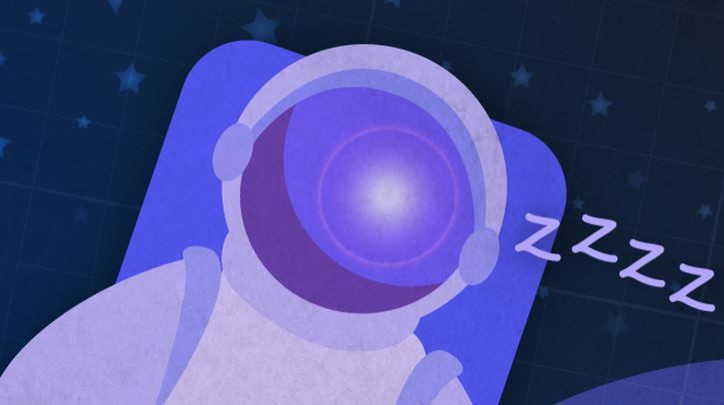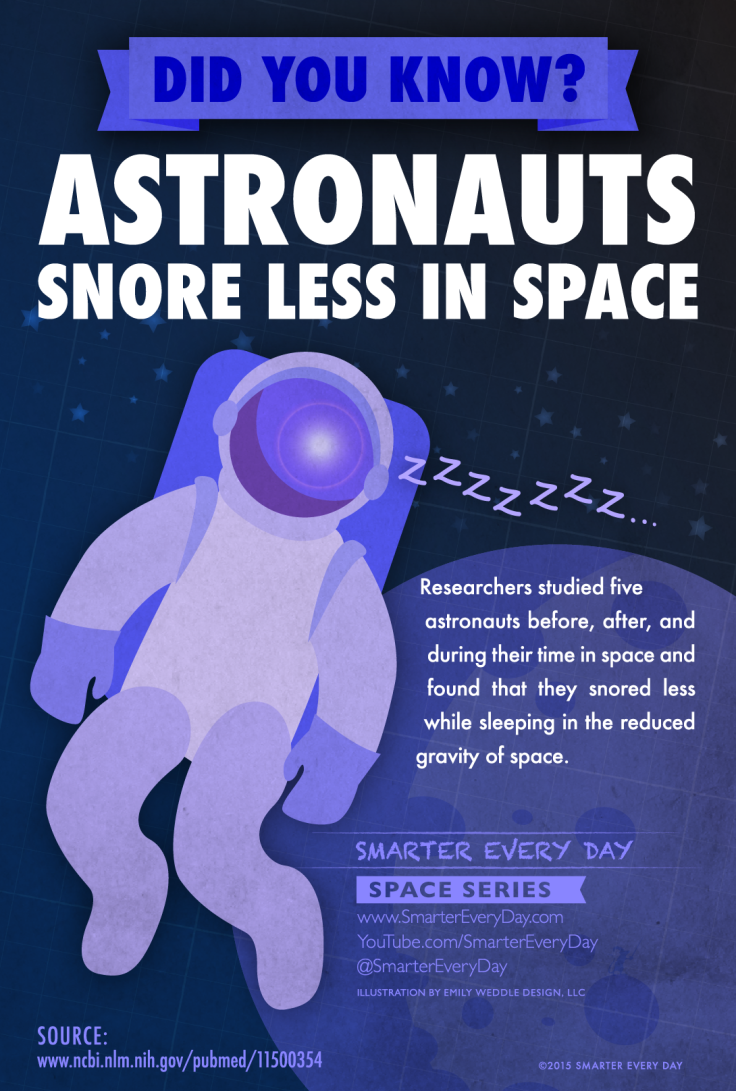Astronauts Don't Snore In Space, Plus 4 Other Little-Known Facts About Snoring

A lot of people snore — about 90 million Americans, according to the American Sleep Apnea Association. Snoring and sleep apnea are often conflated, since loud and frequent snoring is a hallmark sign of the sleep disorder. Yet, the ASAA points out that sleep apnea will almost always cause patients to snore, but snoring won’t always cause sleep apnea.
If it’s not sleep apnea, then why do we snore? Discovery News said scientists generally don’t know why, but one convincing idea is that it’s simply something we as humans have evolved to do. The loud noises could have been a mechanism to scare off scavengers when our ancestors would sleep in the wild.
Otherwise the noises we associate with snoring come from the back of the mouth, or the uvula. Discovery explained the tongue and tonsils can be involved, but it’s really just the relaxing of the throat; when your body relaxes, the soft flesh can bunch up and cause air to enter your body irregularly. Those pockets of air then slap the soft flash to cause vibrations and noise. They’re triggered by everything from sleep apnea to weight — too much fat around the neck weighs down the muscles — and certain sleeping positions.
What other little-known facts are out there about snoring? We rounded up five of the better ones here:
Predictor Of Bad Health And Behavior
A 2013 study published in JAMA dubbed snoring as the not-so-silent health killer. As previously mentioned, sleep apnea patients snore so loud because their airways are partially obstructed — but snoring can also affect your heart. Researchers from the Henry Ford Hospital in Detroit found that snoring may be the first sign of cardiovascular damage.
In children, snoring may be a predictor of future bad behavior. Studies have shown child snorers were more likely to develop hyperactivity disorder, as well as emotional problems, including anxiety and depression. One report from the Melbourne Monash Institute of Medical Research believes snoring wakes children up enough to affect their learning and behavior.
No Snoring In Space
AsapSCIENCE cited a research study from the National Institutes of Health that found the lack of gravity makes it so astronauts snore less while they’re sleeping. Dr. J.D. Polk, a flight surgeon, told ABC News that less gravity equals less airway obstruction.
"Earthly snoring occurs when gravity pulls the tongue and soft tissues in the rear of your mouth backward," Polk said. "If your airway is partially obstructed you get these tissues flapping. In microgravity, the tongue and the jaw do not fall back in the throat, so there is less airway obstruction in space."

Some People Snore As Loud As Jackhammers
Discovery News found that the sound of a person’s snore can reach 92 decibels, or the sound of a jackhammer. But The Daily Mail found one woman who snores much louder than that. Apparently, chronic snorer Jenny Chapman, who was 60 at the time, snores every night at 111.6 decibels, which is eight decibels louder than a low-flying jet plane.
“I was shocked to hear how loud my snoring was at its peak,” Chapman said. “I knew I was noisy but not that noisy. ”
Louder snoring may be able to predict metabolic syndrome. A study published in the journal Sleep found that commonly reported sleep symptoms can lead to developing the syndrome, an otherwise key risk factor for heart disease.
Women Risk Maternal And Newborn Health
Women who snore three or more nights each week may be more likely to have cesarean sections and smaller babies, the University of Michigan Health System found when studying 1,673 pregnant women in 2014; 35 percent were reportedly regular snorers. And women who didn’t start snoring until after they were pregnant were at increased risk for high blood pressure and preeclampsia.
"If we can identify risks during pregnancy that can be treated, such as obstructive sleep apnea, we can reduce the incidence of small babies, C-sections and possibly NICU [neonatal intensive care unit] admission that not only improve long-term health benefits for newborns but also help keep costs down," Louise O'Brien, an associate professor at U-M's Sleep Disorders Center, concluded.
Snore Rooms Are A Thing
Snoring encourages partners to sleep in separate bedrooms — this you know. Snoring, a different bed time, and a respect for a partner’s solitude are why 30 to 40 percent of couples have decided to sleep apart, The Huffington Post reported. But did you know some couples are actually building snore rooms?
Mission Impossible actor Tom Cruise reportedly built a snore room for his ex-wife Katie Holmes, per NBC News, and it’s basically a separate room that’s connected to the bathroom in some way. Think of a bathroom or dressing room, MarketWatch reporter Amy Hoak told The Wall Street Journal. And it’s a room that’s built to absorb sound and reduce overall noise. Some couples are starting to ask realtors and home builders to include this type of room while they’re house hunting.
Do you snore a lot? Brush up on these helpful tips to stop snoring, including vocal warm-ups and special foods.



























